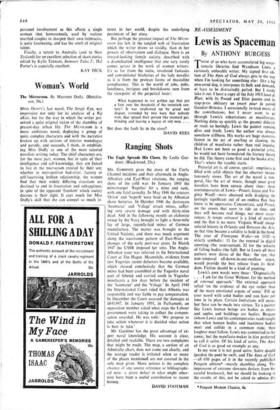Woman's World
The Microcosm. By Maureen Dully. (Hutchin- son, 30s.) Miss DuFFv's last novel, The Single Eye, was impressive not only for its analysis of a flip affair, but for the way in which the writer pre- sented a quite original vision of the shambles of present-day urban life. The Microcosm is a more ambitious novel, deploying a group of quite complex characters and with the narrative broken up with sections of interior monologue and parody, and succeeds, I think, in establish- ing Miss Duffy as one of the most talented novelists writing today. The chief characters are, for the most part, women, but in spite of their intelligence and self-knowledge, they are forced to live in the microcosm created by their sex; whether in metropolitan bed-sitter, factory or self-lacerating lesbian relationship, the women find that their widely differing situations are destined to end in frustration and unhappiness, in spite of the apparent 'freedom' which society decrees is their right. It says much for Miss Duffy's skill that she can compel so much in- terest in her world, despite the underlying pessimism of her story.
But perhaps the greatest impact of The Micro- cosm lies less in the tangled web of frustration which the writer draws so vividly, than in her powers of observation and dialogue. Here is an inward-looking female society, described with a disenchanted intelligence that one very rarely comes across in the work of women writers; it's as far from the static, involuted fantasies and conventional bitcheries of the lady novelist as it is from the protean forms of masculine complacency. This is the world of jobs, pubs, loneliness, intrigues and breakdowns seen from the viewpoint of the perpetual loser: What happened to our golden age that put a foot over the threshold of the twentieth cen- tury? It was swallowed up by greed and disgust, corroded by two wars that nobody won, that spread their poison like mustard gas, blinding and leaving a legacy of old men. ...
But does the fault lie in the stars?
DAVID REES


































 Previous page
Previous page